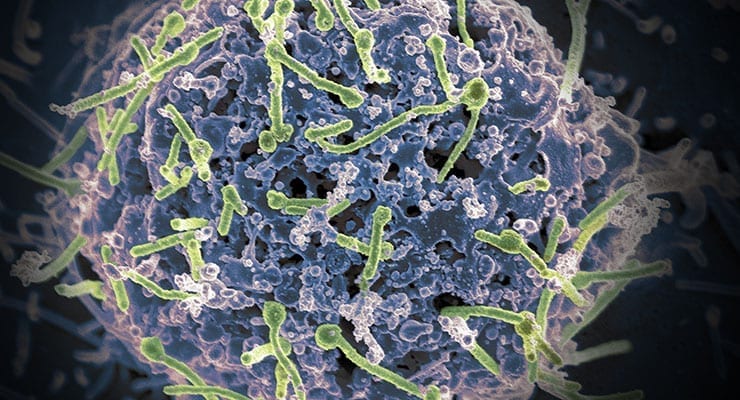Preliminary results of a study into persistence of Ebola virus in body fluids show that some men still produce semen samples that test positive for Ebola virus nine months after onset of symptoms.
The report, published this week in the New England Journal of Medicine, provides the first results of a long-term study being jointly conducted by the Sierra Leone Ministry of Health and Sanitation, the World Health Organization and the U.S. Centers for Disease Control and Prevention.
The first phase of this study has focused on testing for Ebola virus in semen because of past research showing persistence in that body fluid. Better understanding of viral persistence in semen is important for supporting survivors to recover and to move forward with their lives.
“These results come at a critically important time, reminding us that while Ebola case numbers continue to plummet, Ebola survivors and their families continue to struggle with the effects of the disease. This study provides further evidence that survivors need continued, substantial support for the next 6 to 12 months to meet these challenges and to ensure their partners are not exposed to potential virus, ” said Bruce Aylward, WHO Director-General’s Special Representative on the Ebola Response.
Ninety three men over the age of 18 from Freetown, Sierra Leone, provided a semen sample that was tested to detect the presence of Ebola virus genetic material. The men enrolled in the study between two and 10 months after their illness began. For men who were tested in the first three months after their illness began, all were positive (9/9; 100 percent). More than half of men (26/40; 65 percent) who were tested between four to six months after their illness began were positive, while one quarter (11/43; 26 percent) of those tested between seven to nine months after their illness began also tested positive. The men were given their test results along with counseling and condoms.
“EVD survivors who volunteered for this study are doing something good for themselves and their families and are continuing to contribute to the fight against Ebola and our knowledge about this disease,” said Yusuf Kabba, National President of the Sierra Leone Association of Ebola Survivors.
Why some study participants had cleared the fragments of Ebola virus from semen earlier than others remains unclear. The U.S. Centers for Disease Control and Prevention in Atlanta is conducting further tests of the samples to determine if the virus is live and potentially infectious.
“Ebola survivors face an increasing number of recognized health complications,” said CDC Director Tom Frieden, M.D., M.P.H. “This study provides important new information about the persistence of Ebola virus in semen and helps us make recommendations to survivors and their loved ones to help them stay healthy.”
The researchers emphasized the importance of further investigation. “Although our findings are based on a cohort of 100 male survivors of EVD, the public health implications are still uncertain. The ongoing study of quantitative RT-PCR positivity and virus isolation in semen will provide better estimates of the duration of viral persistence and related probabilities of persistence at various points in time.”
Until more is known, the more than 8,000 male Ebola survivors across the three countries need appropriate education, counseling and regular testing so they know whether Ebola virus persists in their semen; and the measures they should take to prevent potential exposure of their partners to the virus. Until a male Ebola survivor’s semen has twice tested negative, he should abstain from all types of sex or use condoms when engaging in sexual activity.
“Sierra Leone is committed to getting to zero cases and to taking care of our survivors , and part of that effort includes understanding how survivors may be affected after their initial recovery,” said Amara Jambai, M.D., M.Sc., Deputy Chief Medical Officer for the Sierra Leone Ministry of Health and Sanitation. “Survivors are to be commended for contributing to the studies that help us understand how long the virus may persist in semen.”
Read more: Ebola RNA Persistence in Semen of Ebola Virus Disease Survivors — Preliminary Report
Sources: CDC.gov, NEJM



